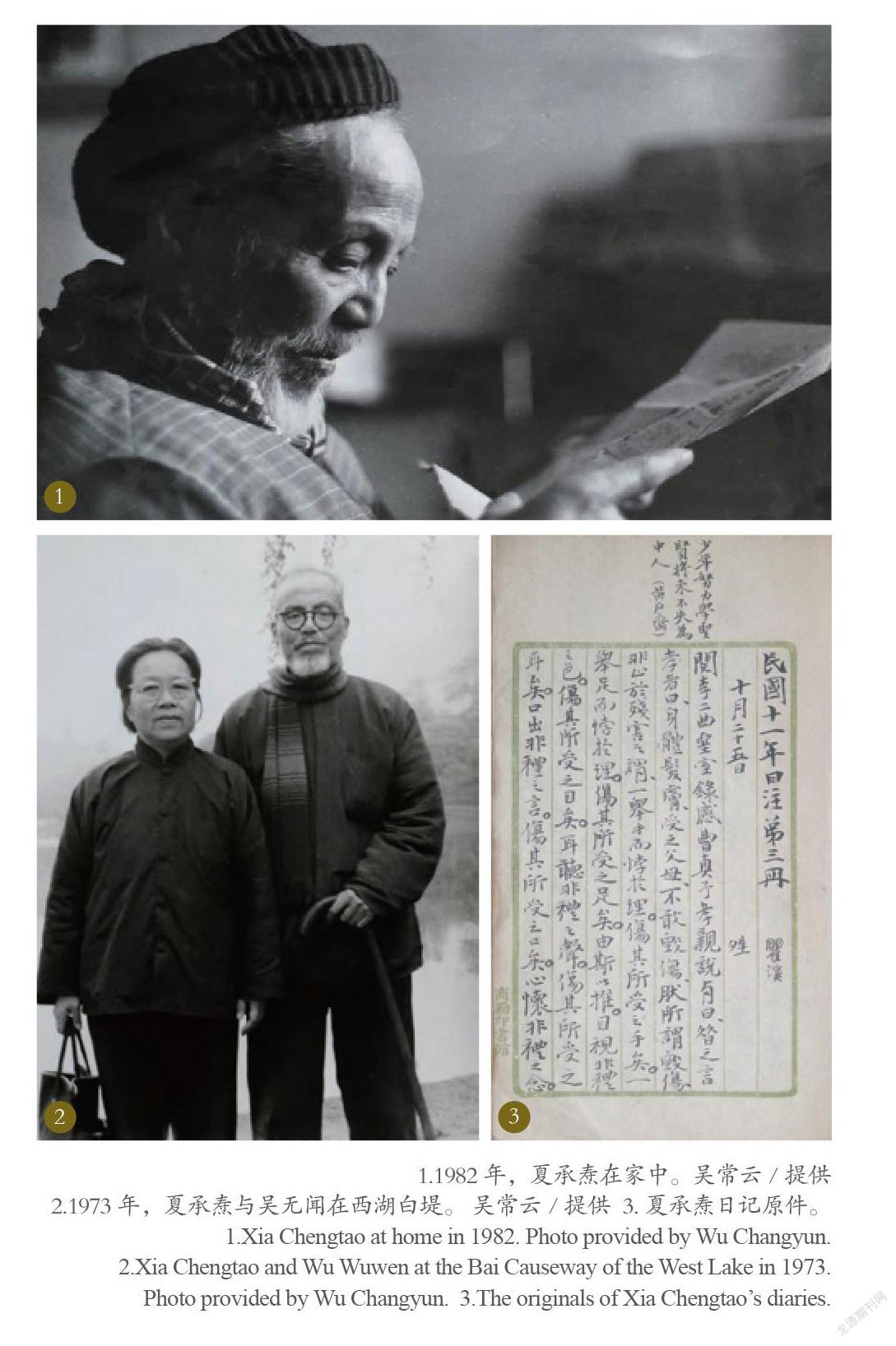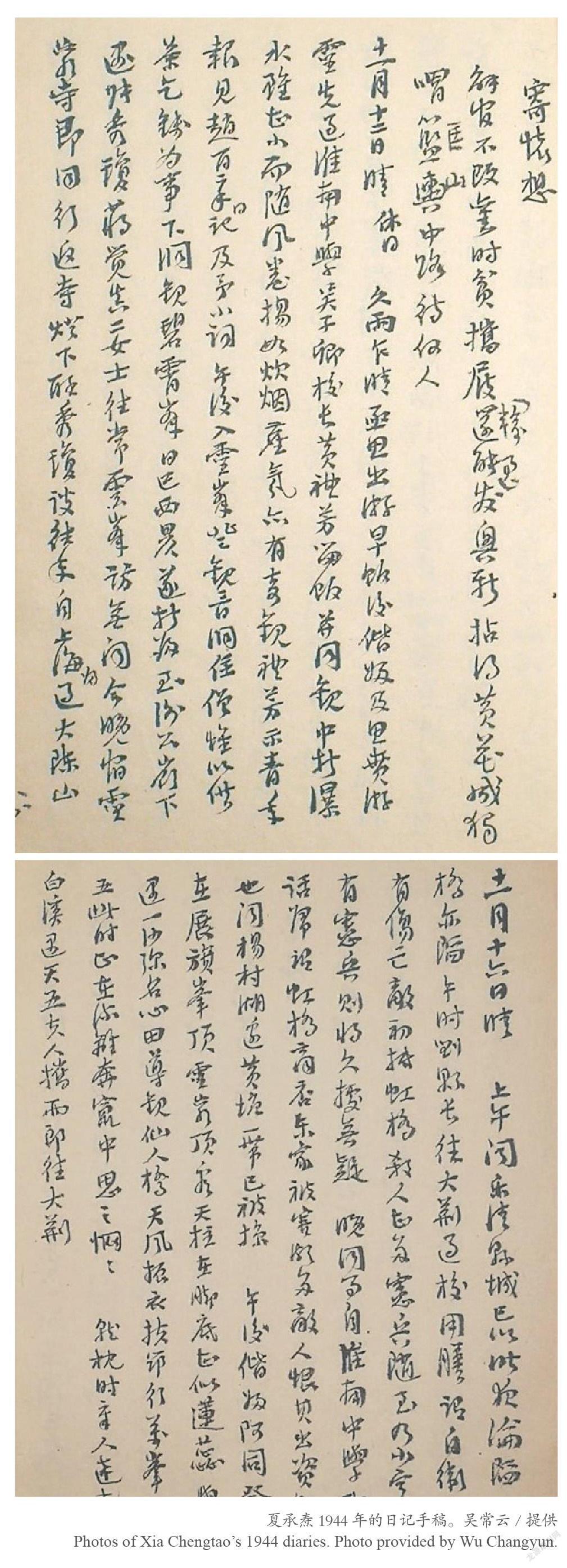此间长风忆故人
2022-06-30李娇俨
李娇俨



不久前,500万字的《夏承焘日记全编》(以下简称《日记全编》),在历时12年的整理后终于付梓出版。全书据日记原稿重新整理,收录了夏承焘从1916年至1985年近70年(中间有数年日记佚失)的日记。其中不仅有他曾在浙江走过的万里路,也有他曾读过的万卷书,还有那个值得被铭记的大师辈出的时代。
夏承焘, 是20世纪最为杰出的词学家之一,现代词学的开拓者。他的一系列词学研究著作,堪称中国词学史上的丰碑。夏承焘生于温州永嘉,在杭州执教多年。每到清明,在淳安县羡山夏公墓前,不断有人手捧献花,前来祭扫。这里正是被称为“一代词宗”的夏承焘(1900——1986)的墓地。
改变
整理完《夏承焘日记全编》,夏承焘再传弟子、本书的主编吴蓓,也养成了记日记的习惯。
“读完所有日记后,我惊叹于夏先生的坚持。能够数十年如一日地去记录自己的生活而不间断,不是寻常人能做到的。”吴蓓说。
在长达半个世纪的岁月中,夏承焘位居东南词坛祭酒,治词授业之余,与海内外词家、学人声气相通,其中有老辈的陈衍、朱祖谋、冒广生、夏敬观,也有同辈的龙榆生、唐圭璋、钱仲联、邓广铭,更有晚辈的朱生豪、琦君、吴熊和等。
因此,保留了原稿全貌的《日记全编》,可以说反映了夏承焘个人生活、读书撰述、朋交游览、教书育人以及当时社会等的方方面面,是考察20世纪文化生活、知识分子心路历程、学术升沉进退的绝佳文本,并提供了多重思维角度。
提到《日记全编》背后的整理出版过程,吴蓓说,这项工作在很大程度上改变了她的人生轨迹。
天风阁为夏承焘的室名之一。1984年至1997年间,吴蓓的父亲、夏承焘的弟子吴战垒,与师母吴无闻、同门吴熊和合作,在浙江古籍出版社筹备出版了《天风阁学词日记》三编,但其中仅选钞了与“学词”有关的部分,并不完整。吴战垒一直心心念念想出《夏承焘全集》,将日记的所有内容呈现给世人。
由于种种原因,这项愿望最终没能在吴战垒手中完成。几十年来,夏承焘、吴无闻、吴战垒先后逝世。2010年,出版《日记全编》的担子,最终落在了此前从未参与过这项工作的吴蓓身上。
“整理日记是我父亲的遗愿,我一定会完成它。但接到那一大堆夏先生手稿后,我才发现太难了。”吴蓓告诉记者,搜集齐手稿就几经波折,理清手稿、复印、拍照也是一个大工程,识字录稿对于初识夏先生字体的人都是一个难关,校稿的周期也很长。出版社编辑任务繁重,也把这项难度大的工作排到了后边。
此外,这是一部当代人的日记,其中涉及的许多人还在世。从历史的角度看,当代的人事,或许要经过更长时间的沉淀,编辑者才可以取得比较妥当的处置,读者也可以更为冷静、客观地看待。
12年后,凝聚了三代學人心血的《日记全编》终于出版。与《天风阁学词日记》相比,新书增加了约360万字,补充了1916年至1928年、1966年至1985年、中间原遗失的1933年等数十年日记,以及以前曾删削的内容。
承载词学大家一生的文字里,有太多东西值得研究了。吴蓓说,本以为出版完《日记全编》,很多事情可以放下,但是没想到一个个研究课题在脑海里接连蹦出。未来的数年,都还会围绕着《全集》以及日记后续的研究工作做安排,争取让一代词宗的“宝藏人生”闪烁更大的光芒。
“如果有时间和精力,其实我更想编一部电视连续剧,让大家看看夏先生的精彩人生,和那个传奇的历史年代。”吴蓓笑说。
乐游
当笔者把编电视剧的想法转述给夏承焘之子吴常云时,电话那头传来了十分爽朗的笑声。
“父亲是一个非常谦和的人。晚年时,他也能和年轻学生打成一片。他主张多读书,但要‘乐读,不要‘苦读,学生们总说他讲课时笑容可掬。”吴常云回忆到。
听了这番描述,一个亲切可爱的老先生的形象马上映入脑海。这样的人写日记,文字间也溢满了风趣。如果有一部电视剧讲述日记里的故事,它的基调也一定是乐观的,让我们可以捕捉日常生活中的美好。
一代大儒马一浮在夏承焘日记中出现多次。“夏先生为人谦逊,而马先生的个性却是卓尔不群,特立独行。”吴蓓说,这两个人碰在一起,总有一丝幽默诙谐藏于其间。
1931年,二人共同好友设宴,这两位常通书信的“网友”才在宴会上第一次碰面。日记里说,夏承焘对马一浮的初印象是“修髯岸然……谈学撝谦,而不多发论议”。
两个多月后,这个“第一印象”在马一浮家中被打破了。某天,夏承焘前往延定巷卅二号拜访马一浮。两人切磋学问,马一浮先是大发议论,认为民国名僧苏曼殊在佛学上造诣不深,随后又就宋词音律说宋代词人吴文英作的词不可歌唱:“次谈及词律……翁谓……梦窗词恐不可唱。”
没想到,这一举动不乏“班门弄斧”的嫌疑。夏承焘曾专攻词律,对此不以为然。他马上举了个例子来反驳,他不说“我以为”,他只是说从张炎的词题来看,梦窗词本来是可以唱的。白胡子的马一浮先生只好在旁“唯唯”点头。
当然,日记里的马一浮也有谦虚的一面。1952年的元宵节,夏承焘去苏堤看望马翁,并赠词一首,其中有赞马一浮可“坐替雷峰”的词句,马翁连连摇头称“不敢当”。
在日记中,夏承焘还称赞陈寅恪“不愧一代大师”,感叹与同在一校的钱穆“爱而不见”,担心胡适“恐不肯作答”自己寄去的信……
与诸多近代大师的交往,打开了夏承焘通往词学高峰的大门。1929年冬,由龙榆生介绍,夏承焘开始给当时的词学大师朱祖谋写信。不久,他收到了来自老前辈的一封亲笔信,信中对夏承焘的治学给予了肯定,还说“宏著有写定者,尚盼先睹也”。这封信让夏承焘深受感动,立刻被他恭录进自己的日记里。
翻阅日记,我们又看到,夏承焘津津有味地读着西洋小说《小妇人》《基督山恩仇记》《巴黎圣母院》,他的小说之魂随即被点燃,忍不住冲动写了篇小说《偷表记》(后改名为《秘密上帝》);他还曾想编一本《黄汉奸诗钞》,让此等卖国求荣者遗臭万年……FD729EA9-C798-4257-BCB3-514545E92FA6
继续往下读,我们还能看到,日记中有十年浸润经史的坚持与魄力,也有对人生前路的彷徨与犹豫;既有可青史留名的大人物的雪泥鸿爪,也有仿若你我的小人物的家长里短……五百万字汇成了平凡却又不凡的一生,足够我们细细品鉴。
山水
古人常云“读万卷书,行万里路”,这也是夏承焘的治学理念。雁荡山,正是他游历山水的开始。
温州有许多诗人活动过的地方,东晋开始就见诗人足迹。十四岁那年,夏承焘报考孙怡让创办的温州师范学校。入学后,他的大部分自修时间都用于读经、读诗文集子,并开始了旧体诗的創作。同时,他也喜欢访求名胜,登临山水。
十五岁游平阳的南雁荡,十六岁登乐清的北雁荡。游览雁荡山水的少年夏承焘,挥毫一笔,留下了“游踪虽未半天下,已胜当年谢客儿”的诗句。
“前路千峰初放晴,夕阳好处是归程”。多年后,夏承焘游经雁荡显胜门处,路过真际寺时,又以抒情的笔调,再度融入自己的感时情绪,描摹着雁荡的清空美景。
桐庐,也是夏承焘心中一处山明水秀之地。日记中写,1925年开始,夏承焘在严州第九中学任教。这里是一个美丽的风景区,严子陵钓台也位于其中。“好山只觉浙西多,又向桐君招手过”,桐庐的美景,曾经酝酿他无数的诗情。
在这里,夏承焘写下了一首《浪淘沙》:“万象挂空明,秋欲三更,短篷摇梦过江城。可惜层楼无铁笛,负我诗成。杯酒劝长庚,高咏谁听,当头河汉任纵横。一雁不飞钟未动,只有滩声。”这首词被视为夏承焘的代表作之一。在日记里初出现时,题目即是“桐庐”,后来改为“过七里泷”。“在我父亲弥留之际,他让我母亲给他吟诵的就是这首词。”吴常云说。
在国家蒙难、时世离乱之际,人们或许更会意识到名山秀水的可贵。抗战时期,夏承焘再次路过桐庐,他对着桐江的碧波不住感慨。“一星在水依然碧,世外今何夕?故人出处幸相忘,容我五更伸脚过桐江。”一首《虞美人 · 自杭州避寇过钓台》,道出了隐匿于桐庐山水背后的哀愁。
雁荡为家,桐庐寄情,夏承焘的大半生却是在西子湖畔度过的。日记中记载,三十岁时,他到之江大学任教,直到1976年才离开杭州。
刚到之江大学时,他住在钱塘江边秦望山的月轮峰上,与六和塔为邻。小楼一秀,俯临大江。江声帆影,常在心目。
美景自然催生词情。夏承焘写了多首《望江南》,来勾勒眼前所见。“秦山好,面面面江窗。千万里帆过矮枕头,十三层塔管斜阳,诗思比江长。”此地山水带来了美好的心境,夏承焘的治词生涯,也由此跨出了重要的一步。
他说,自己把游历和读书一样看待,正是希望自己的诗词文章,能够得到江山之助。这番志向,也不断被传递给后一辈。
“叮”,笔者的微信上收到了吴常云发来的一幅水墨画,只见一匹神清骨峻的骏马呈奔跑状,似乎要越出画面,画右上角落有夏承焘款的一句杜诗 :风入四蹄轻。何不就像这匹马儿一样,驰骋万里,饱览之江大地大好河山?
In Remembrance of Xia Chengtao and His Sparkling Life Stories
By Li Jiaoyan
Not long ago, the Complete Collection of Xia Chengtaos Diaries (hereinafter referred to as the Diaries) of five million Chinese characters was finally published after 12 years compiling and editing. The whole set has been reorganized based on the original manuscripts, a collection of Xias diaries from 1916 to 1985 (some were lost). It is a record of the thousands of miles he covered in Zhejiang, the piles of books he read, and an era of masters that is worth to remember.
Xia Chengtao (1900-1986) is one of the 20th-century masters of Chinese ci poetry, and the pioneer of modern ci poetry, and his works are a monument to Chinese ci poetry. Born in Yongjia, Wenzhou, Xia came to Hangzhou and taught here for many years. Every Qingming Festival, crowds of people go to pay their respects at Xias tomb in Chunan county, with flowers in their hands.
After compiling the Diaries, Wu Bei, the books editor-in-chief and also Xias apprentice, grew her own journal-keeping habit. “When finished reading Mr. Xias full diary collection, I was astonished at how he kept recording his life uninterrupted, which common people are just incapable of,” said Wu.FD729EA9-C798-4257-BCB3-514545E92FA6
Since the Diaries preserve Xias original manuscripts in the entirety, they pretty much reflect all aspects of his personal life and the social landscape back then. Therefore, the whole set is considered an excellent text for examining the cultural and academic life of the 20th century and a source of multiple perspectives for thinking.
Looking back at the whole editing and publishing of the books, Wu Bei said that this project has changed her life to a great extent.
Between 1984 and 1997, Wu Zhanlei (Wu Beis father and one of Mr. Xias disciples), Wu Wuwen (Mr. Xias wife) and Wu Xiong (another of Mr. Xias disciples), published Diaries on Ci Poetry Learning at Tianfengge (Tianfengge is the name of Xias study) with Zhejiang Ancient Books Publishing House, which is only a small selection of Xias manuscripts. But Wu Zhanlei was denied the chance ever after to publish a whole collection of his teachers diaries. In 2010, this unfulfilled cause was passed on to his daughter, who had never been involved before.
“However determined I am, when I got this giant mountain of manuscripts, I realized this is too difficult for me,” Wu Bei told me. Collecting the whole manuscripts was full of twists and turns, let alone all the sorting out, copying, photographing of the collected manuscripts, and recognizing Mr. Xias handwriting.
Moreover, this is a collection of contemporary diaries, and many of the people involved in it are still alive — from a historical perspective, it is necessary for the editors and readers to take some time and ruminate before they could look at such literature calmly and objectively.
About 12 years later, the Diaries containing the wisdom and effort of three generations of scholars, was finally published. Compared with the Diaries on Ci Poetry Learning at Tianfengge, the new collection adds about 3.6 million characters, including the diaries of 1916-1928, 1933 (previously missing) and 1966-1985, as well as contents that had been removed before.
In the next few years, Wu will continue to arrange her research work around the Diaries in order to make the sparkling life of Mr. Xia, the Ci grandmaster, shine even brighter. “Actually I would prefer to make a TV series about his wonderful life and that legendary historical era,” Wu Bei said, laughing.
When I phoned Wu Changyun, son of Xia Chengtao, and conveyed the idea of making a TV series to him, a very cheerful laughter came from the other end of the phone.FD729EA9-C798-4257-BCB3-514545E92FA6
“My father was a very modest person. Even as an old man, he was still able to mingle with young students. He advocated reading, but‘happy reading, not‘hard reading, and students always say he wore a big smile in giving lectures,” Wu Changyun recalled.
Hearing this description, the image of a kind, lovely old gentleman immediately came to my mind. If there is a TV series telling his stories, it is surely an optimistic one, where the beauty of everyday life is captured.
There is a great Zhejiang scholar named Ma Yifu (1883-1967) appearing several times in Xias diaries. “Mr. Xia was a humble man, while Mr. Ma was somewhat peculiar.” When these two people met, said Wu, there was always a touch of humor and wit exchanged between them.
Xias interactions with many modern masters such as Chen Yinque (1890-1969) led to his prime in his study of ci poetry. In the winter of 1929, introduced by Long Yusheng (1902-1966), Xia Chengtao began to write letters to Zhu Zumou (1857-1931), a then great master of ci poetry. Soon, he received Zhus personal response, in which Zhu affirmed Xias scholarship and said, “I am looking forward to seeing the first masterpiece of yours.” Xia was so touched by Zhus letter that he immediately wrote this anecdote into his diaries.
Looking through Mr. Xias diaries, we could see his great interest in Western novels, his perseverance and courage as well as his uncertainty and hesitation. He presents his ordinary yet extraordinary life in his five-million-character journal for later generations to peruse.
As an ancient saying goes, “read ten thousand books, travel ten thousand miles”, which is also the philosophy of Xia Chengtao. Yandang Mountain was the beginning of his travels, and he repeatedly wrote poems about this beautiful mountain since he was fifteen years old. Later he visited Tonglu, and was also captivated by the majestic sceneries there.
However, it was at West Lake in Hangzhou that Xia spent most of his lifetime. According to his diaries, at the age of thirty, he went to Hangchow University to teach, and did not leave Hangzhou until 1976.
When he first arrived at Hangchow University, he lived by the Qiantang River, adjacent to the Liuhe Pagoda. Watching the beautiful scenery, he felt an urge to write poems about what he saw before his eyes. And he thus was filled with a happy state of mind, and his research career subsequently took an important step forward.
Xia viewed his travels as important as his studies, precisely because he hoped that his poems and articles could be enhanced in the company of the rivers and mountains. This ambition of his has been continuously passed on to future generations.FD729EA9-C798-4257-BCB3-514545E92FA6
